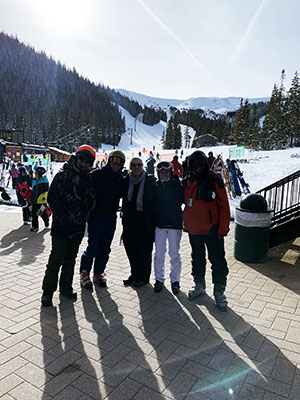
Team Members
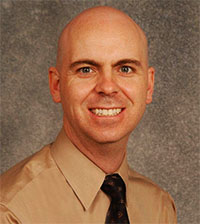 Dr. Todd Hankinson
Dr. Todd Hankinson
CU School of Medicine Profile
 Vincent Chen, PhD
Vincent Chen, PhD
Glioblastoma (GBM) has a poor prognosis in both adults and children, with the median overall survival rate sitting at 11-18 months and 5 years, respectively. Standard-of-care involves resection of the tumor, radiotherapy, and temozolomide. Immunotherapies, while having seen massive success in various tumor types, are ineffective against glioblastoma. For example, immune checkpoint inhibition requires a high mutational burden to be efficacious, but GBM tends to have a low mutational burden. Chimeric antigen receptor (CAR) T cell therapy has also proven to be ineffective against solid tumors such as glioblastoma, with the highly immunosuppressive environment being responsible for such failure. My project aims to address these issues; I am engineering human macrophages to express chimeric antigen receptors targeting B7H3, a commonly expressed immunomodulatory surface antigen in glioblastoma.
 Pavan Guttipatti
Pavan Guttipatti
 Aaron Knox, PhD
Aaron Knox, PhD
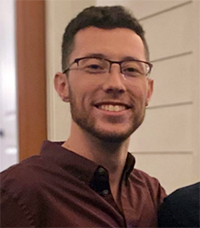 Stephen Medlin, MS
Stephen Medlin, MS
I am from Houston, Texas. I received my bachelor’s degree in Biomedical Science from Texas A&M University – Corpus Christi and my master’s degree in Physiology from Tulane University School of Medicine. My most recent work, before CU Anschutz, was at the Harris County Institute of Forensic Science as a Serology/DNA Operations Technician in the forensic genetics’ crime lab. Prior to that I was an adjunct professor for the Department of Biology at Lone Star College. My current projects focus on primary ACP cell lines, the heterogenic component of the tumor, and therapeutic trials. My goal in the Hankinson lab is to help advance our understanding of Adamantinomatous Craniopharyngioma, the tumor environment, and potential therapeutic treatments.
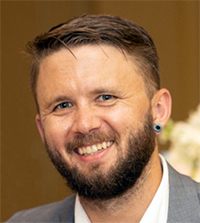 Eric Prince, PhD
Eric Prince, PhD
I am a Computational Bioscience PhD student at CU Anschutz focused on the application of machine learning and artificial intelligence to basic and clinical science within pediatric neuro-oncology. Using ACP as a model, I am investigating the use of human-centered design to develop explainable artificial intelligence systems tailored to support clinical decision-making related to neuroimaging. I complement this clinical research aim with basic science investigations into ACP pathophysiology, primarily via next-generation sequencing analysis. Thanks to the collaborating members of the Advancing Treatment for Pediatric Craniopharyngioma consortium, we have access to a comprehensive dataset comprised of genomics and clinical imaging that makes research like mine possible. I like to spend my free time in the mountains, typically snowboarding, cycling, or camping. I also enjoy checking out the various excellent craft breweries that Colorado has to offer!
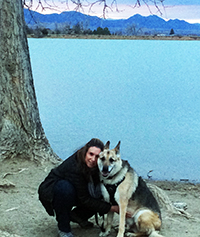 Susan Staulcup
Susan Staulcup
I am the project manager for Dr. Hankinson’s national Advancing Treatment for Pediatric Craniopharyngioma Consortium (ATPC) and work with the participating sites to obtain tissue and clinical data as well as work with our local patients and families here in Colorado.
 Callista Tran
Callista Tran
I am a medical student at the University of Colorado School of Medicine, Class of 2028. I graduated from Colorado College with a B.S. in Biochemistry and minors in Human Biology, Molecular Biology, and Kinesiology. At Colorado College, I spent three years in an organic chemistry lab working with the Distributed Drug Discovery (D3) project on developing dipeptides with potential anti-bacterial properties using Solid-Phase Peptide Synthesis (SPPS). I also spent two years working on a dexmedetomidine and uterine contraction study with the Anesthesiology department at Children’s Hospital Colorado.
At the Hankinson-Mitra lab, I am currently working on identifying if MYC regulated CD24 and CD47 mediated immune responses Grp3 Medulloblastomas.
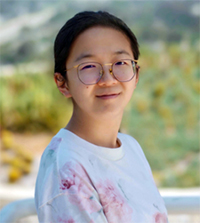 Yan Zhou
Yan Zhou
I am a medical student at the University of Colorado School of Medicine, Class of 2027. I graduated from the University of California, Los Angeles with a Neuroscience B.S. and a Biomedical Research Minor. At UCLA, I spent four years in a neurosurgery lab studying spinal cord injury and neuromodulation.
Joining the Hankinson-Mitra lab since MS1, I have been working on both basic science and clinical projects on ACP. Currently, I am investigating the biological mechanisms of radiation and drug resistance in ACP using both 2D cell culture and 3D organoids, with the goal of improving treatment response. Clinically, I am using a multi-center database (ATPC) to study ACP outcomes and progression, aiming to better characterize its clinical features. My career goal is to become a neurosurgeon-scientist, integrating patient care and research to better help patients with neurological conditions. In my spare time, I enjoy skiing, hiking, and exploring national parks.
Past:
- Oscar Chatain (2020-2022) - Medical student at Liberty University
- Keanu Chee (2020-2024) - Neurosurgery Resident, University of Washington
- Astrid Hengartner (2019-2020) – Medical Student (Yale University)
- Trinka Vijmasi (2018-2020) – Resident in General Surgery, New York, NY
- Ros Whelan (2017-2018) – Pediatric Neurosurgeon, Children’s Hospital of Michigan
Hankinson
Laboratory
